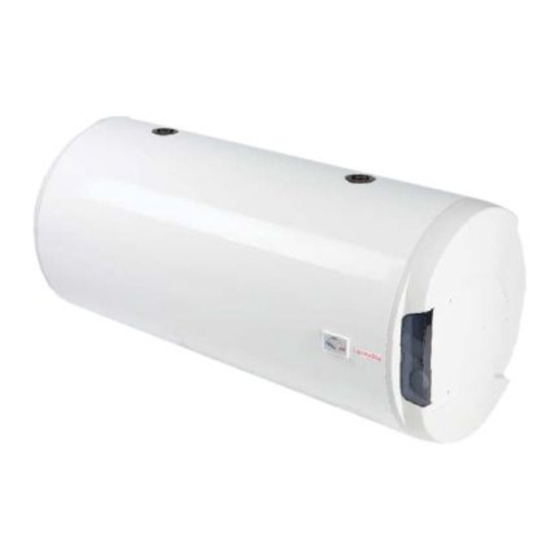Drazice OKCEV 180 Manuale di funzionamento e installazione - Pagina 15
Sfoglia online o scarica il pdf Manuale di funzionamento e installazione per Scaldabagno Drazice OKCEV 180. Drazice OKCEV 180 19.

Drainage of service water shall be performed after closing the shut-off valve in the cold
water supply piping (through the discharge valve for safety valve combination), and with
simultaneous opening of all hot water valves of connected fittings. Hot water may outflow
during the drainage! If there is a risk of frost it has to be considered that not only the water
in the hot water heater and in the hot water piping may get frozen but also the water in the
entire cold water supply piping. It is therefore advisable to drain all fittings and piping that
carry water, up to the part where the house water meter is installed (connection of the
house to water main) which is not jeopardised by frost. When the tank is put in service
again, it has to be ensured that it is filled with water and the water flowing out at the hot
water valves is free of bubbles.
2.8 INSPECTION, MAINTENANCE & CARE FOR THE APPLIANCE
During the heating process the water that increases its volume during the heating must
visibly drip off the safety valve outlet (in non-pressurised connection this water drips off the
combination faucet valve). In full heating (about 65
3.5% of the tank capacity. The function of the safety valve has to be checked regularly. If the
safety valve control knob is lifted or turned to the "Control" position, the water must flow
out easily, without any obstacles, from the safety valve element to the outfall line. In
common operation, such a check needs to be carried out at least once a month, and after
each heater shutdown that exceeds 5 days.
Caution! In doing so, the cold water supply pipe and the connection fitting of the tank may
get heated! If the hot water heater does not work, or if hot water is not withdrawn, no
water shall drip off the safety valve. If water drips, then the water pressure in the supply
piping is either too high or the safety valve is defective. Please call a specialised plumber
immediately!
If water contains too many minerals, an expert has to come to remove the scale that forms
inside the tank, as well as free sediments. This has to be performed after one or two years of
operation. Repetitive water heating causes limestone sediment on both the tank walls and
chiefly the flange lid. The sedimentation depends on the hardness of water heated, its
temperature, and amount of hot water consumed.
We recommend checking and cleaning the tank from scale and eventual replacement of
the anode rod after two years of operation. The anode life is theoretically calculated for two
years of operation; however, it changes with water hardness and chemical composition in
the place of use. Based on such an inspection, the next term of anode rod exchange may be
determined. Have the company in charge of service affairs clean and exchange the anode.
When draining water from the heater, the combination faucet valve for hot water must be
open, preventing occurrence of under-pressure in the heater tank which would stop water
from draining. The cleaning is carried out through the hole in the flange - dismantle the
flange lid and clean the tank. A new sealing has to be used for re-fitting. Since the inside of
the heater has special enamel, which must not get in contact with the scale removing agent -
o
C) the volumetric water gain is approx.
- 15 -
